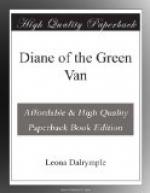A little later on the Sherrill porch he found himself listening with tired patience to Aunt Agatha’s opinion of camping in the Everglades.
“What with your Esquimaux,” she puffed tearfully, “and the immigrant who wasn’t an immigrant—and I must say this once, Carl, for all I promised to ask no further questions, that you never attempted to explain that performance to my satisfaction—the young man with the eye, you know, and the immigrant with his feet on the lace spread—to say nothing at all of Diane’s losing herself in the flat-woods over a cart wheel of flame, I wonder I’m not crazy, I do indeed! And riding off to Jacksonville with the Indian girl, for all I’ve lain awake night after night seeing her scalp lying by the roadside! It was bad enough to have you in those horrible Glades, but Diane—”
“Aunt Agatha,” said Carl patiently, “what in thunder are you driving at anyway?”
“Why,” said Aunt Agatha in aggrieved distress, “Diane’s gone and left Johnny at some funny little hamlet and she’s gone into the Everglades to a Seminole village with the Indian girl. There’s a letter in my room. You can read for yourself.”
Aunt Agatha burst into tears. Carl patiently essayed a comforting word of advice and followed Dick indoors to seek relief in less calamitous showers. Before he did so, however, he read his cousin’s letter.
For that night and the night following Carl did not sleep. On the morning of the third day, after a careless inquiry he went to West Palm Beach and interviewed some traders who were reported to be on the eve of an expedition into the Everglades with a wagonload of scarlet calico and beads to trade for Indian products.
The fourth day he was missing.
CHAPTER XXXVIII
IN PHILIP’S WIGWAM
For hours now, Carl had lain hidden in the waist-high grass, staring at the Seminole camp. The sun had set in a wild red glory in the west, staining dank pool and swamp with the color of blood. The twilight came and with it the eerie hoot of the great owls whirring by in the darkness. Unseen things crept silently by. Once a great winged wraith of ghostly white flapped by with a croak, a snowy heron, winging like a shape of Wrath Incarnate, above the crouching man in the grass. The wheel fires of the Seminoles flared among the live oaks, silhouetting dusky figures and palmetto wigwams.
By the swamp the night darkened. Carl had thrown himself upon the grass now, his white, haggard face buried upon his arm. Back there scarcely a mile to the east lay the camp of the traders. In the morning they would ride into the Indian camp saddled with bright beads and colored calicoes. In the morning—Carl shuddered and lay very quiet, fighting again the ghastly torment that had racked and driven him into the melancholy solitude of the Everglades. Now the firelit palmetto roof of the wigwam he knew to be Diane’s seemed somehow, to his distorted fancy, redder than the others—the color of blood. There, too, was the wigwam of Keela, bringing taunting desire.




